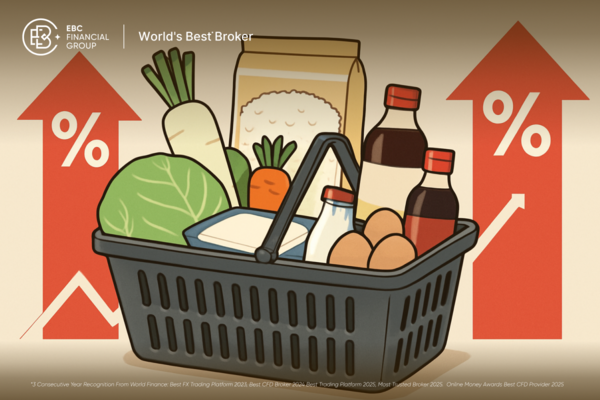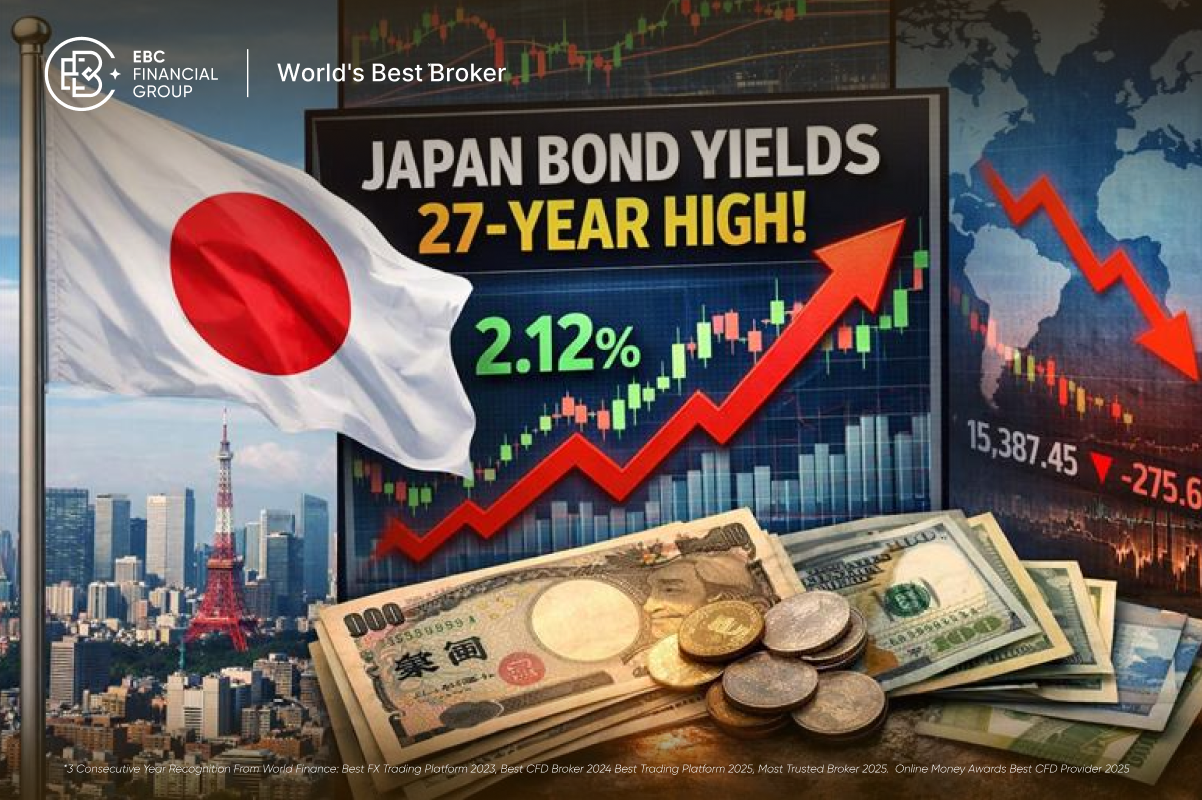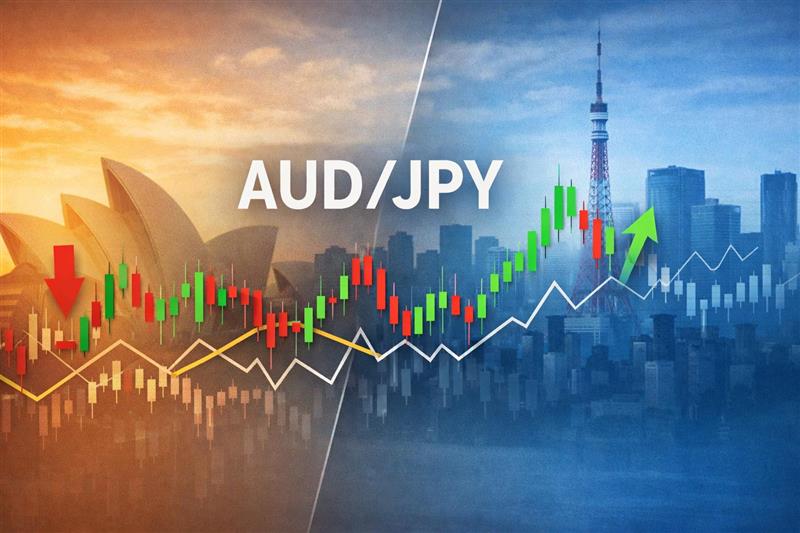Japan's September inflation figures released this morning showed core consumer prices climbing 2.9% year-over-year, matching economist forecasts exactly and accelerating from August's 2.7% reading.
The data confirms inflation remains well above the Bank of Japan's 2% target, yet the yen weakened following the announcement, with USD/JPY rising 0.45% to trade at 152.65.
The unexpected market reaction stems from new Prime Minister Sanae Takaichi's stimulus plans and advocacy for easy monetary policy, which overshadowed the inflation data and dampened expectations for aggressive BOJ tightening at next week's October 29-30 policy meeting.
September Inflation Results
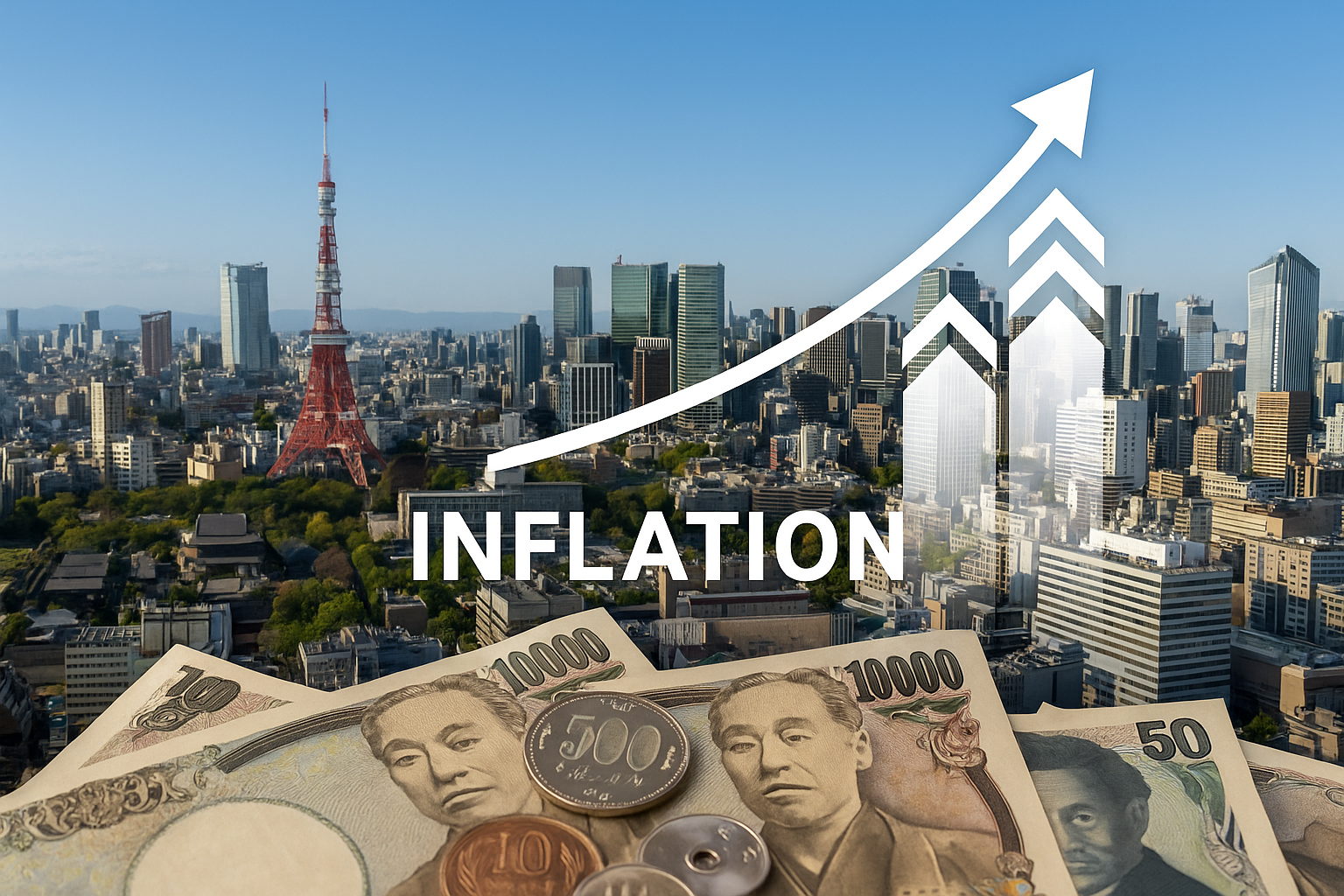
The Statistics Bureau published the Consumer Price Index at 8:30 AM Japan Standard Time on October 24, revealing inflation details across multiple categories.
Core CPI Components:
Core inflation: 2.9% year-over-year, matching consensus forecast precisely.
First acceleration in four months after a steady decline from earlier highs.
Headline CPI: 2.9% year-over-year, up from 2.7% in August.
Energy Price Rebound:
Electricity prices: Jumped 3.2% compared to a 7.2% decline in the previous month.
Gas costs: Rose 1.6% versus a prior 2.7% drop.
Driver: Energy costs rebounded after temporary government subsidies expired.
Core-Core Inflation (BOJ's Focus):
Core-core CPI: Eased to 3.0% from August's 3.3%.
Significance: More closely watched by the Bank of Japan as a gauge of underlying price trends.
Interpretation: Deceleration suggests some moderation in persistent inflationary pressures.
Food and Rice Prices:
Food prices (ex fresh): Remained elevated at over 7% year-over-year. [1]
Rice prices: Moderated significantly in September after soaring nearly 100% in June due to poor harvests and panic-buying after megaquake warnings.
Government response: Deceleration reflects efforts to contain staple food costs, a major voter concern.
Services vs. Goods Inflation:
Services sector: 1.4% year-over-year (subdued).
Goods prices: 4.2% year-over-year (elevated).
Divergence meaning: Companies are gradually passing higher labour costs to consumers, but the pace remains slower than goods inflation driven by raw materials and energy.
Bank of Japan Rate Decision Outlook
Bank of Japan Governor Kazuo Ueda indicated last week that officials would examine additional data before deciding on rates at the upcoming meeting.
The central bank currently holds its benchmark short-term rate at 0.5%, the highest level since 2008.
Today's inflation data keeps alive expectations for a near-term rate hike, as core CPI remains well above the 2% target. A Reuters poll conducted before the data release showed 56% of economists expect a rate hike by year-end, with October being the most likely timing.
However, the easing in core-core inflation to 3.0% provides the BOJ with justification for caution if officials choose to delay.
Two board members dissented at the September meeting, voting for an immediate hike. Those internal divisions suggest some policymakers view current inflation levels as requiring action despite uncertainty about economic conditions.
The bank will release updated quarterly forecasts for growth and prices during next week's session, which typically carry significant weight in shaping rate decisions.
TD Securities analysts note that whilst goods inflation accelerates, service-sector price growth shows signs of cooling.
This mixed picture complicates the BOJ's assessment of whether inflation is broadening sufficiently to warrant additional tightening.
Political Pressure: Takaichi's Stimulus Plans
The yen's weakness following today's in-line inflation data reflects a new political dynamic. Sanae Takaichi became Japan's first female prime minister on Tuesday, inheriting an economy where cost-of-living concerns helped topple her predecessor after barely a year in office.
Key policy positions driving market reaction:
Expansionary fiscal stance: Takaichi has long advocated for increased government spending and easy monetary policy to spur growth. [2]
Immediate stimulus action: Immediately after taking office, she instructed her cabinet to draw up measures addressing household budget pressures, signalling a stimulus package exceeding $90 billion.
Market impact: Her appointment has boosted stock markets to record highs but pressured the yen as traders interpret her stance as potentially delaying BOJ rate hikes.
BOJ independence concerns: The new prime minister's policy preferences create tension with the Bank of Japan's independence.
Accommodative policy preference: Whilst inflation data would normally support tightening expectations, Takaichi's clear preference for accommodative policy introduces political considerations that may influence the central bank's calculus.
Currency market pricing: Markets are pricing in this political risk, explaining why the yen underperformed G-10 peers despite inflation meeting forecasts.
USD/JPY Market Reaction and Price Levels
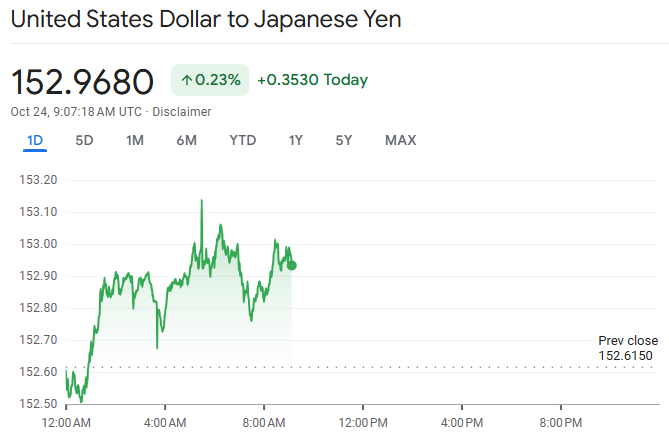
The dollar-yen pair initially moved from 152.626 to 152.672 immediately after the data release, then settled at 152.65, up 0.45% on the day. The muted response to consensus inflation data reflects market focus shifting toward political factors and BOJ meeting expectations.
| Price Level |
Significance |
| 156.97 |
Primary resistance; historical intervention zone |
| 152.50 |
Immediate resistance; current testing level |
| 152.00 |
Psychological resistance; intervention risk increases |
| 151.50 |
Near-term support; October buying zone |
| 149.49 |
Year-end forecast target |
| 147.54 |
Strong support; would require a policy shift |
| 145.35 |
12-month forecast level |
Over the past month, the yen has weakened 2.46% against the dollar. Several factors continue to pressure the currency lower beyond today's data. The interest rate gap between Japan and the United States remains wide, making dollar-denominated assets more attractive. Current Fed funds rates sit at 4.00%-4.25%, whilst Japan maintains just 0.5%, creating a substantial carry trade advantage.
Political uncertainty surrounding Takaichi's fiscal plans adds another layer of yen weakness. Her stated commitment to expansionary policy suggests the government may not support aggressive BOJ tightening, reducing the likelihood of rapid rate increases that would narrow the US-Japan yield differential.
Currency strategists now watch whether USD/JPY can sustain levels above 152 without triggering verbal intervention from Japanese officials. Finance Ministry authorities typically express concern when rapid yen weakness threatens to push import costs higher, exacerbating household inflation pressures. However, they have shown reluctance to act unless moves turn disorderly.
What the Data Means for BOJ Meeting
Today's 2.9% core CPI reading keeps the Bank of Japan on track for potential tightening but doesn't force immediate action. The data provides ammunition for both hawks and doves on the policy board. Hawks can point to inflation remaining well above target for over three years, justifying continued rate normalisation. Doves can highlight the easing in core-core inflation to 3.0% and relatively subdued services price growth as reasons for caution.
Market pricing currently assigns roughly 60% probability to a 25 basis point rate hike at the October 29-30 meeting. This moderate expectation reflects balanced risks between inflation persistence and economic uncertainty. Governor Ueda's press conference following the meeting will be crucial for signalling whether December remains in play if October passes without action.
Citigroup economists noted that the BOJ faces a challenging decision balancing data-dependent policy against political pressure from the new administration. Takaichi's clear preference for easy money complicates the central bank's communication strategy even as inflation data supports tightening.
The updated quarterly forecasts released during next week's meeting will provide important clues about the BOJ's medium-term inflation view. If officials revise projections higher, it would strengthen the case for additional rate increases before year-end. Conversely, downward revisions would justify a more cautious approach.
Final Thoughts
Today's inflation data confirms price pressures remain elevated but shows some moderation in underlying trends. The 2.9% core reading matched forecasts exactly, removing surprise as a factor in next week's deliberations. Instead, the BOJ must weigh persistent above-target inflation against political pressure for continued accommodation and mixed signals from core-core measures.
The September CPI release removes one uncertainty heading into the BOJ meeting, but introduces new questions about how political considerations will influence monetary policy under Japan's new prime minister. [3]
Disclaimer: This material is for general information purposes only and is not intended as (and should not be considered to be) financial, investment, or other advice on which reliance should be placed. No opinion given in the material constitutes a recommendation by EBC or the author that any particular investment, security, transaction, or investment strategy is suitable for any specific person.
Sources
[1] https://economictimes.indiatimes.com/markets/stocks/news/boj-likely-to-hold-rates-amid-persistent-inflation/key-cpi-data-september-2025/slideshow/124777025.cms
[2] https://www.reuters.com/world/asia-pacific/japans-new-pm-is-preparing-large-economic-stimulus-tackle-inflation-sources-say-2025-10-22/
[3] https://www.businesstimes.com.sg/international/japans-core-inflation-accelerates-september-stays-above-boj-target
